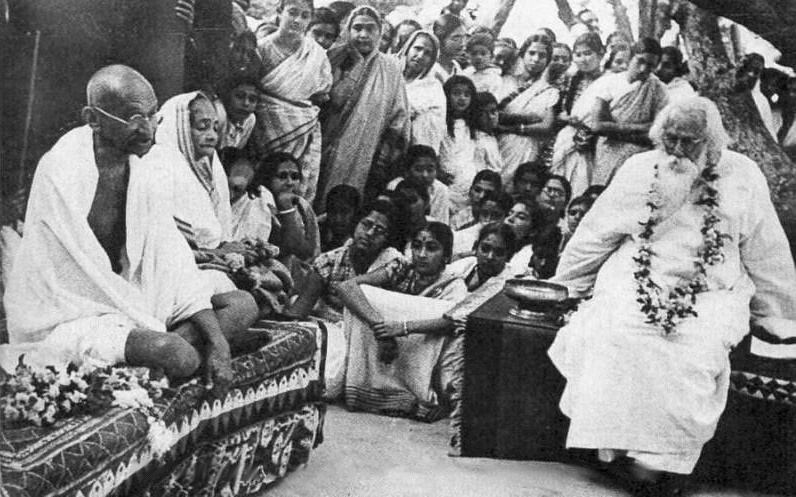|
Rabindra Nritya Natya
Rabindra Nritya Natya is the group of four dance-dramas composed by Bengal's Nobel laureate Rabindranath Tagore: ''Chitrangada'', ''Chandalika'', ''Shyama and Shrabangatha''.History of Bengali Literature, Dr. Dulal Chakraborty, July 2007, Bani Bitan. . The principal characteristic of these works is that the story is told entirely through dance and song. The dances included in them were in the dance form created by Tagore. Tagore also included dance in earlier works such as ''Tasher Desh'' (), though these are not regarded as ''Rabindra Nritya Natya''. See also * Santiniketan Santiniketan is a neighbourhood of Bolpur town in the Bolpur subdivision of Birbhum district in West Bengal, India, approximately 152 km north of Kolkata. It was established by Maharshi Devendranath Tagore, and later expanded by his son ... References *http://www.tagoreweb.in/Render/ShowContentType.aspx?ct=Plays *http://www.geetabitan.com/ {{West Bengal Bengali culture Memorials to Rabi ... [...More Info...] [...Related Items...] OR: [Wikipedia] [Google] [Baidu] |
Bengal
Bengal ( ; bn, বাংলা/বঙ্গ, translit=Bānglā/Bôngô, ) is a geopolitical, cultural and historical region in South Asia, specifically in the eastern part of the Indian subcontinent at the apex of the Bay of Bengal, predominantly covering present-day Bangladesh and the Indian state of West Bengal. Geographically, it consists of the Ganges-Brahmaputra delta system, the largest river delta in the world and a section of the Himalayas up to Nepal and Bhutan. Dense woodlands, including hilly rainforests, cover Bengal's northern and eastern areas, while an elevated forested plateau covers its central area; the highest point is at Sandakphu. In the littoral southwest are the Sundarbans, the world's largest mangrove forest. The region has a monsoon climate, which the Bengali calendar divides into six seasons. Bengal, then known as Gangaridai, was a leading power in ancient South Asia, with extensive trade networks forming connections to as far away as Roman Egypt. ... [...More Info...] [...Related Items...] OR: [Wikipedia] [Google] [Baidu] |
Nobel Laureate
The Nobel Prizes ( sv, Nobelpriset, no, Nobelprisen) are awarded annually by the Royal Swedish Academy of Sciences, the Swedish Academy, the Karolinska Institutet, and the Norwegian Nobel Committee to individuals and organizations who make outstanding contributions in the fields of chemistry, physics, literature, peace, and physiology or medicine. They were established by the 1895 will of Alfred Nobel, which dictates that the awards should be administered by the Nobel Foundation. The Nobel Memorial Prize in Economic Sciences was established in 1968 by the Sveriges Riksbank, the central bank of Sweden, for contributions to the field of economics. Each recipient, a Nobelist or ''laureate'', receives a gold medal, a diploma, and a sum of money which is decided annually by the Nobel Foundation. Prize Each prize is awarded by a separate committee; the Royal Swedish Academy of Sciences awards the Prizes in Physics, Chemistry, and Economics; the Karolinska Institute awards the Prize ... [...More Info...] [...Related Items...] OR: [Wikipedia] [Google] [Baidu] |
Rabindranath Tagore
Rabindranath Tagore (; bn, রবীন্দ্রনাথ ঠাকুর; 7 May 1861 – 7 August 1941) was a Bengali polymath who worked as a poet, writer, playwright, composer, philosopher, social reformer and painter. He reshaped Bengali literature and music as well as Indian art with Contextual Modernism in the late 19th and early 20th centuries. Author of the "profoundly sensitive, fresh and beautiful" poetry of ''Gitanjali'', he became in 1913 the first non-European and the first lyricist to win the Nobel Prize in Literature. Tagore's poetic songs were viewed as spiritual and mercurial; however, his "elegant prose and magical poetry" remain largely unknown outside Bengal. He was a fellow of the Royal Asiatic Society. Referred to as "the Bard of Bengal", Tagore was known by sobriquets: Gurudev, Kobiguru, Biswakobi. A Bengali Brahmin from Calcutta with ancestral gentry roots in Burdwan district* * * and Jessore, Tagore wrote poetry as an eight-yea ... [...More Info...] [...Related Items...] OR: [Wikipedia] [Google] [Baidu] |
Santiniketan
Santiniketan is a neighbourhood of Bolpur town in the Bolpur subdivision of Birbhum district in West Bengal, India, approximately 152 km north of Kolkata. It was established by Maharshi Devendranath Tagore, and later expanded by his son, Rabindranath Tagore whose vision became what is now a university town with the creation of Visva-Bharati.Pearson, WW.: ''Santiniketan Bolpur School of Rabindranath Tagore'', illustrations by Mukul Dey, The Macmillan Company, 1916 History In 1863, Debendranath Tagore took on permanent lease of land, with two ( Alstonia scholaris) trees, at an annual payment of Rs. 5, from Bhuban Mohan Sinha, the talukdar of Raipur, Birbhum. He built a guest house there and named it ''Shantiniketan'' (the abode of peace). Gradually, the whole area came to be known as Shantiniketan.Basak, Tapan Kumar, ''Rabindranath-Santiniketan-Sriniketan (An Introduction)'', p. 2, B.B.Publication Binoy Ghosh says that Bolpur was a small place in the middle of the 19th ... [...More Info...] [...Related Items...] OR: [Wikipedia] [Google] [Baidu] |
Bengali Culture
The culture of Bengal defines the cultural heritage of the Bengali people native to eastern regions of the Indian subcontinent, mainly what is today Bangladesh and the Indian states of West Bengal and Tripura, where the Bengali language is the official and primary language. Bengal has a recorded history of 1,400 years. The Bengali people are its dominant ethnolinguistic group. The region has been a historical melting point, blending indigenous traditions with cosmopolitan influences from pan-Indian subcontinental empires. Bengal was considered to be the richest part of Islamic medieval India and during the era of the Bengal Sultanate it was described to be a major trading nation in the world, while during Mughal times, having triggered the proto-industrialization, its economy was worth 12% of global GDP. However, significant socio-economic inequalities existed during this period. As a part of the Bengal Presidency, it also hosted the region's most advanced political and cult ... [...More Info...] [...Related Items...] OR: [Wikipedia] [Google] [Baidu] |



